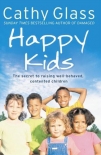Happy Kids, Cathy Glass [best ebook reader for ubuntu .TXT] 📗

- Author: Cathy Glass
Book online «Happy Kids, Cathy Glass [best ebook reader for ubuntu .TXT] 📗». Author Cathy Glass
As unacceptable as the badly behaved child is, so too is the precocious child, who has been brought up to believe that the whole world revolves around them, that their view is the only one and that others are there to fit in with them. The preschool age group has an abundance of this type of child whose parents have over-indulged all their whims, in the mistaken belief that they were encouraging individuality. The parents take pride in what they have done and point out the child’s resulting (precocious) behaviour to anyone who will listen:
Claire insists on having her tea at her little table in front of the television, instead of eating with us.
Tom will only wear Adidas [designer] trainers.
Claire prefers older children. She finds children her own age a bit babyish.
All of the above, and more, I have heard said recently by proud and doting parents of rising fives, who misguidedly believed they were encouraging positive individuality in their child, but were actually encouraging precociousness and storing up trouble for later. Claire should have been made to sit at the table for a family meal (using the 3Rs technique if she resisted). Tom’s materialistic attitude to footwear is likely to land him and his parents in the bankruptcy court, as well as encouraging an unhealthy emphasis on the labels of clothing rather than functionality. And for Claire to be viewing her peer group as beneath her is not only elitist and derisory but will also be a big hindrance to her making friends.
As with so much of successful parenting, it is a matter of balance. Encourage your child’s autonomy and individuality, but don’t let your child take over and take charge. At this age, with the child’s growing sense of liberation and independence, and being away from you at nursery, there is the potential for him or her to try to take the reins. If he does, you could wake up one morning to find your life totally revolving around your child’s, with your personality being swamped by theirs. If you feel this is already happening, and your control is being eroded, then rein in your child. Put in place your routine and boundaries and ensure positive and age-appropriate behaviour using the 3Rs:
* Request – your child to do something or stop doing something in a friendly but firm manner.
* Repeat your Request.
* Reaffirm – if your Request with the added warning that a sanction will follow, or give a reward if your request has been complied with. Remember that the reward need only be verbal – ‘Good girl/boy’ – but praise is always important.
CHAPTER THREE
More Techniques
Before going on to the next age group, five to eight, it is worth pausing for a moment to look at some very important issues.
The importance of respect
We have seen some additions to the 3Rs – Reassure becomes Reaffirm when disciplining, and rules are put in place using the 3Rs technique. Respect is another important R, possibly the most important: both respect from your child to you and other family members, and the respect you show your child.
The reason you Request your child to do something rather than demand is out of the respect you have for your child. You wouldn’t demand something of another adult (unless you wanted a punch on the nose), and neither should you ever demand or command your child to do something. Always treat your child with the respect you would show another adult, and which you expect to be shown. Use an even, polite voice (it can still be firm) when addressing your child and be considerate of his or her feelings. The dictionary definition of respect is ‘a feeling of admiration for someone because of their qualities or achievements', which sums it up nicely. Admire your child – he or she has already achieved an awful lot in a few short years – and always insist your child shows you the same admiration and respect, whether they are aged three or twenty-three.
If your child is disrespectful, either through words or through actions, then modify his or her behaviour using the 3Rs, Requesting: ‘Tom, don’t speak to me like that, please. How should you ask for something?’ And when Tom rephrases his request, praise him – ‘Good boy, that’s better.’ Don’t ignore small acts of disrespect as left unchecked small acts will grow into bigger acts of disrespect, with the result that your authority, and therefore discipline, will be severely undermined.
You don’t need me to tell you what respect feels like: when treated in an admiring and polite manner we glow with an inner warmth. Conversely, disrespect, both from adults and children, stings and makes us feel worthless; if it is allowed to continue it grows like a canker, undermining our sense of self-worth and confidence. Politeness is a big part of respect: teaching your child to say please and thank you; not to snatch and grab; to request rather than demand; to be aware of and respond to others’ feelings and wishes; to cooperate and have patience – all help him or her become respectful.
There is a saying that ‘What goes around comes around', and treating your child with respect will certainly reap its own rewards: he or she will copy your behaviour and treat you with the same respect. Children reflect the behaviour they see around them, positive and negative; they absorb it subconsciously like a sponge. If your dealings with your child are always respectful, then your





Comments (0)